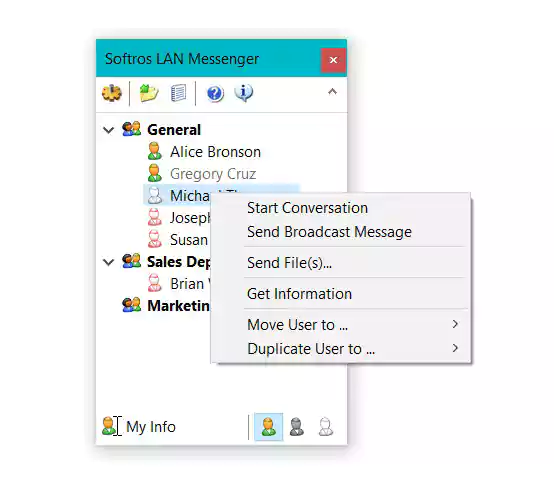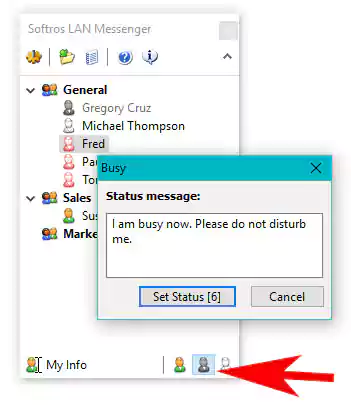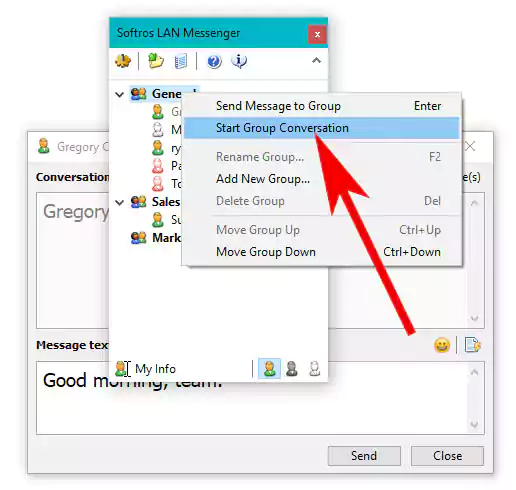The effectiveness of business largely depends on the quality and speed of communication: within the team, with clients, suppliers, and partners. The most convenient tool for this is a corporate instant messenger. It will help set up work in the transition to a group chat to discuss everyday tasks that arise in the company.
What is a messenger for the local network?
The main features of the corporate chat:
A corporate messenger can be an effective solution for a company if it has the following needs:
A chat app is also useful if a lot of coordination happens during the working day, there is a large flow of information, and it is important to monitor the situation for each employee. The message history will tell you what the status of the communication is, what documents need to be sent or when to call.
Corporate messaging platforms are tailored specifically for business use and offer more features than mass-market messaging apps. They also typically offer higher levels of data transmission security, often using the AES protocol. These messaging platforms can be customized to meet the needs of a specific company and can be managed by the IT department. Additionally, technical issues can be swiftly resolved by the software provider.

Corporate messengers help increase productivity in the team. Users can set up alerts, mark their presence at the workplace, and not be distracted by personal messages. For example, Softros LAN messenger has a function of showing colleagues’ statuses: you set the “Do not disturb” status during a meeting, and other employees save time and do not try to contact you.

The servers used for messaging belong to third parties. You have no control over the security of data transmission and access to it by unauthorized people. Corporate network programs are successful because the rules within them are determined by the owner of the company.
Messengers can be divided into three categories: free, serverless, and client-server. They have both advantages and disadvantages, that are worth considering when choosing.
These are commercial products: RealPopup, Lancetchat, and Softros. All of them are characterized by a closed system: users see only each other and cannot communicate with the “outside world”. This is a tool for interaction within the team, file transfer, and remote access via the local network.
Serverless LAN messengers are suitable for networks of up to 100 workplaces. They work without internet access and do not load network traffic. They are also ideal when you need a system of information without feedback (message broadcasting). For private conversations, this is one of the best solutions, as they exclude sending messages to friends outside work and other external recipients.
A more complex IT infrastructure requires other solutions, such as client-server solutions. Their “central” client is installed on a remote or local server, and the systems run on a UNIX or Microsoft Windows platform. The server is under the control of the administrator – you will be able to monitor the security of data on the network. The message will reach the right addressee, even if he is not online and the information remains on the server. Therefore, for corporate use in contact with partners and clients outside your office, this is one of the suitable types of messengers.
Client-server messengers are installed on the same servers that are used for the company’s daily needs. Therefore, you can connect to the server in almost any way: via a local network, Wi-Fi, Mobile internet, or VPN channel.
Popular Internet messengers have the advantage of being fast and cost-effective to implement. They also often rely on cloud servers, which can ensure uninterrupted communication. However, free options such as Viber, Telegram, and WhatsApp may be vulnerable to access through phone numbers and may not offer a high level of data transfer security.
A potential disadvantage of using personal phones for a corporate messenger is that it can pose a threat to confidentiality when employees leave the company. If the employee changes their phone number, the message history and client contact information may be lost. Additionally, the company will not have access to the server and will not be able to monitor employee conversations. This can be a significant drawback, as it limits the company’s ability to ensure compliance and protect confidential information.
Of course, there are products that are popular in a particular environment – for example, Discord, and Slack in the IT industry. But a messenger in any case should be evaluated in terms of convenience and functionality. Sometimes, the simplicity of the interface and its adaptation to employees who are poorly versed in computer programs become critical.
Before selecting a messenger, make a list of necessary functions. We have prepared a sample list of criteria:
Depending on the line of business, data encryption may be needed. In this regard, it is more reliable to use paid products, whose license agreement requires the safety of information and responsibility for the disclosure of trade secrets. We strongly recommend rejecting free versions of messengers, in which backdoors and other possible changes to the application can be installed to introduce spyware.
Implementing a corporate messenger involves several steps. First, you should determine your criteria for selecting a messenger. Next, you should install the messenger in test mode and have a group of employees use it to test out its various features. This will help you determine which option is the best fit for your needs. If you’re looking for a simple solution, you can consider installing a local messenger that does not require a server.
How the program is installed:
1. Download the application from the program website.
2. Count the number of users you need: install messengers on all computers and phones where you want to use chats.
3. Ask each employee to fill in their name, position, and department.
4. Prepare instructions and train employees on the rules of correspondence and sending files over the network (usually these actions do not cause difficulty for people who have already used messengers)

5. Create chats for projects and departments
6. Configure access rights for those team members who do not need some messenger functions (sending files or messages, remote access)
A corporate messenger can improve communication within your team and optimize your work processes. It is worth considering paid options as they often offer better security for your data. Customization is also important, so be sure to choose a messenger that can be tailored to your company’s specific needs. Don’t forget to try out the messenger during a trial period, if available, to ensure it meets your requirements.
